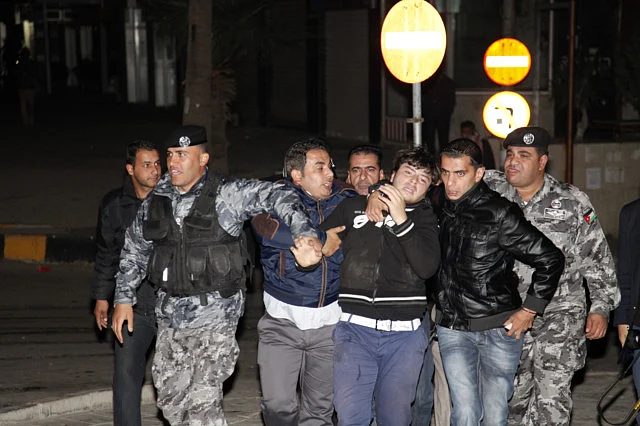Amman, Jordan: A man was killed and a dozen police officers were injured early on Thursday in the northern city of Irbid as demonstrations over increased fuel prices stretched into a second day and opposition leaders scrambled to harness a spontaneous eruption of anger that spread throughout the kingdom, taking officials and opposition leaders by surprise.
The demonstrations were the most aggressive in this politically fragile and strategically critical ally of the United States in the past two years, particularly outside the capital, where many protesters shouted slogans against King Abdullah II that previously would only have been whispered. Teachers went on strike and other unions announced a two-hour work stoppage for Sunday. The crowds included first-time protesters and tribal members who have been the king’s political base.
”This is the beginning of the Jordanian Spring, November 13,” declared Hassan Barari, a political science professor at the University of Jordan, where students blocked a main road near campus. “Because this is no longer a political thing; this is the lives of the people. If you go around to the tribes, this is the backbone of the king, they can’t afford anything. It can’t be worse.”
Analysts and activists said the outpouring since the reduction of gasoline subsidies on Tuesday marked an important shift in the criticism of the leadership in recent months because many of the protesters were not affiliated with political parties, unions or the secular opposition movement.
”It’s popular and spontaneous; it was not called by activists and Islamists,” said Kamal Khoury, an activist and blogger. “It was regular people going crazy about what’s going on.”
Violence was most severe in Irbid, where the authorities said a police station was attacked by armed demonstrators, leading to the fatal shooting of Qasi Omari, 22, and injuries to a dozen police officers and four protesters. A police corporal was also injured when someone fired an automatic pistol from a moving car, the police said in a statement.
In Madaba, an ancient city that draws tourists to its holy sites, protesters tore down the king’s picture and burned it, according to an activist who was there, then smashed windows of several banks, pulling the furniture from one and setting it on fire. Witnesses reported the looting of a discount store for government employees in Salt and the riot police in Tafileh firing bullets into the air.
In Karak, a southern city known for its staunch support of the monarchy, protesters burned the house of the governor.
In Amman, dozens of officers in helmets and body armour blocked access to Dakhliyeh Circle, a popular sit-in site, so hundreds crowded in front of their line, chanting slogans such as “The people know who is the corrupt guy”.
The demonstration began peacefully, but after a few hours protesters threw rocks and burned tyres, and officers responded with tear gas.
Sana Gaith, an artist who said she earned about $211 (Dh775) per month, was a first-time protester who joined the Dakhliyeh gathering. “I can’t afford the living conditions,” she said. “I don’t want anything to happen in the country, but I want them to fix the prices. I’m divided. I’m angry, and I’m scared for the country.”
— New York Times
Sign up for the Daily Briefing
Get the latest news and updates straight to your inbox
Network Links
GN StoreDownload our app
© Al Nisr Publishing LLC 2026. All rights reserved.
